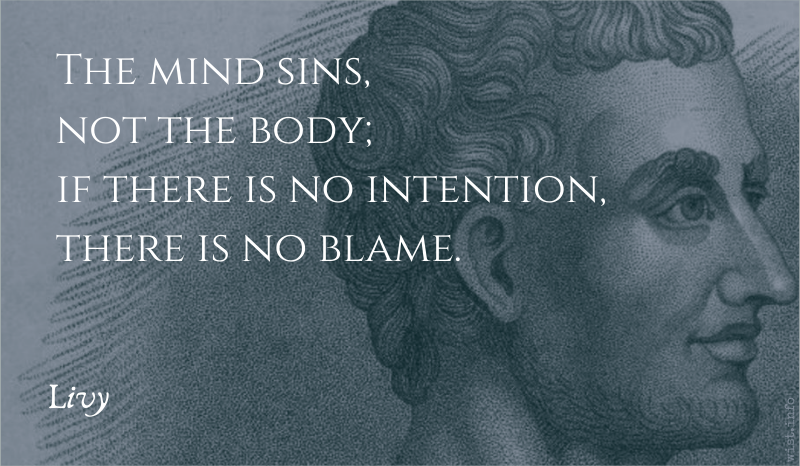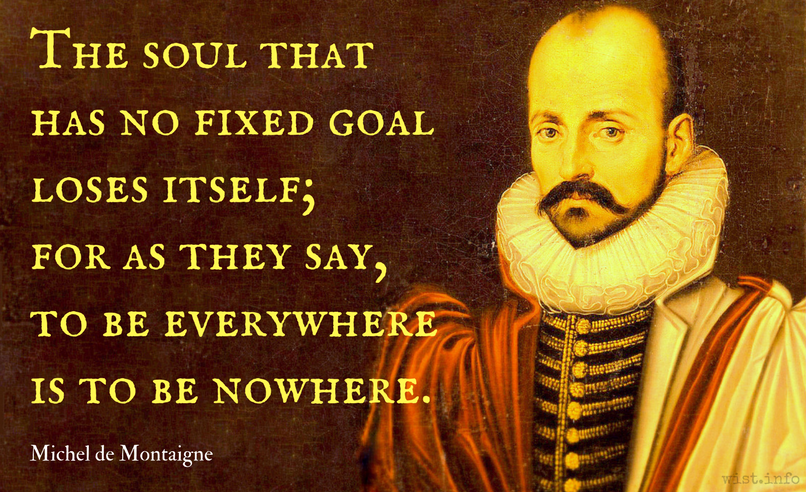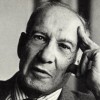Look as much into the Intention of him that praises thee, as of him that calumniates thee.
Thomas Fuller (1654-1734) English physician, preacher, aphorist, writer
Introductio ad Prudentiam, Vol. 1, # 422 (1725)
(Source)
Quotations about:
intent
Note not all quotations have been tagged, so Search may find additional quotes on this topic.
There is in the word, in the logos, something sacred which forbids us to gamble with it. To handle a language skillfully is to practice a kind of evocative sorcery.
[Il y a dans le mot, dans le verbe, quelque chose de sacré qui nous défend d’en faire un jeu de hasard. Manier savamment une langue, c’est pratiquer une espèce de sorcellerie évocatoire.]
Charles Baudelaire (1821-1867) French poet, essayist, art critic
L’Art Romantique, ch. 28 “Théophile Gautier,” sec. 3 (1868) [tr. Gilman (1958)]
(Source)
Originally published in L'Artiste (1859-03-13). It appears in Vol. 3, ch. 8 of the 1885 Œuvres complètes de Charles Baudelaire.
(Source (French)). Alternate translations:There exists in the word, in the verb, something sacred which prohibits us from viewing it as a mere game of chance. To manipulate language with wisdom is to practice a kind of evocative sorcery.
[tr. Jakobson (1981)]There is in a word, in a verb, something sacred which forbids us from using it recklessly. To handle a language cunningly is to practice a kind of evocative sorcery.
[E.g.]
For it’s the will
And not the gift that makes the giver.[Denn der Wille
und nicht die Gabe macht den Geber.]Gotthold Lessing (1729-1781) German playwright, philosopher, dramaturg, writer
Nathan the Wise [Nathan der Weise], Act 1, sc. 5 [Lay Brother/Friar] (1779) [tr. Morgan (1955)]
(Source)
(Source (German)). Alternate translations:The will, and not the deed, makes up the giver.
[tr. Taylor (1790)]'Tis
The will, and not the boon, that makes the giver.
[tr. Reich (1860)]For the will it is
That makes the giver -- not the gift.
[tr. Jacks (1867)]For the will and not the gift makes the giver.
[Source (1873)]The will and not the deed perfects the giver.
[tr. Boylan (1878)]For 'tis the will, and not the gift,
That makes the giver.
[tr. Corbett (1883)]The will and not the gift
Doth constitute the giver.
[tr. Maxwell (1917)]Because the intention and not the gift make the giver.
[tr. Reinhardt (1950)]It's not the gift that makes the giver, no, but rather his good will.
[tr. Ade (1972)]
More undertakings fail for want of spirit than for want of sense. Confidence gives a fool the advantage over a wise man.
Virtue consists, not in avoiding wrong-doing, but in having no wish thereto.
[Ἀγαθὸν οὐ τὸ μὴ ἀδικεῖν, ἀλλὰ τὸ μηδὲ ἐθέλειν.]
Democritus (c. 460 BC - c. 370 BC) Greek philosopher
Frag. 62 (Diels) [tr. Freeman (1948)]
(Source)
Original Greek. Diels cites this as "62. ( 38 N.) DEMOKRATES. 27" ; collected in Joannes Stobaeus (Stobaios) Anthologium III, 9, 29. Bakewell lists this under "The Golden Sayings of Democritus." Freeman notes this as one of the Gnômae, from a collection called "Maxims of Democratês," but because Stobaeus quotes many of these as "Maxims of Democritus," they are generally attributed to the latter.
Alternate translations:
- "To be good is not only not to do an injury, but not so much as to desire to do one." [tr. Clarke (1750), Democrates, "Ethica."]
- "Good means not [merely] not to do wrong, but rather not to desire to do wrong.: [tr. Bakewell (1907)]
- "To be good is not to refrain from wrongdoing but not even to want to commit it." [tr. Barnes (1987)]
- "It is not good to not commit injustice, but rather to not desire to." [tr. @sententiq (2018), frag. 61]
- "Virtue consists not in avoiding wrongdoing, but in having no desire for it." [Source]
The mind sins, not the body; if there is no intention, there is no blame.
[Mentem peccare, non corpus, et unde consilium abfuerit, culpam abesse.]
Livy (59 BC-AD 17) Roman historian [Titus Livius]
Ab Urbe Condita [From the Founding of the City; The History of Rome], Book 1, ch. 58 (27-9 BC)
Reassurances given to Lucretia, wife of Collatinus, after her rape by Sextus Tarquin. She still kills herself.
Different sources use abfuerit or afuerit. Restated as a legal term, it's usually given as Mens peccat, non corpus, et unde consilium abfuit, culpa abest.
Alt. trans.:
- "That it is the mind sins, not the body; and that where intention was wanting guilt could not be." [tr. Spillan (1896)]
- "The mind sins, not the body, and there is no guilt when intent is absent." [tr. Luce]
- "The mind sins, not the body; and where the power of judgment has been absent, guilt is absent." [Source]
- "The mind alone was capable of sinning, not the body, and that where there was no such intention, there could be no guilt." [tr. Baker (1823)]
- "It is the mind that sins, not the body, and where there has been no consent there is no guilt." [tr. Roberts (1905)]
- "It is the mind that sins, not the body; and that where purpose has been wanting there is no guilt." [tr. Foster (1919)]
- "It is the will only that is capable of sinning, not the body; and where there is no intention, there can be no guilt." [Source]
For laws are silent when arms are raised.
[Silent enim leges inter arma.]
Marcus Tullius Cicero (106-43 BC) Roman orator, statesman, philosopher
Pro Milone, ch. 4, sec. 11 [tr. Yonge (1891)]
(Source)
In context, Cicero is asserting that self-defense is a valid defense for killing, even though that principle was not written into Roman law. It has been extended in legal terms to times of war being exempt from normal laws regarding killing.
Alt. trans.:Original Latin.
- "For laws are silent among arms."
- "In a time of war, the law falls silent."
- "Laws are silent in time of war."
- "The laws are silent in warfare."
- "For among arms, the laws fall mute."
- "The power of law is suspended during war."
A gentleman is one who never hurts anyone’s feelings unintentionally.
Oliver Herford (1863–1935) Anglo-American writer, artist and illustrator
(Attributed)
Widely attributed to Herford as early as 1915. Similar in construction to "A gentleman is a man who never gives offense unintentionally," "A gentleman is a person who never insults anyone unintentionally," etc., which go back to at least 1905, and in the late 1920s were attributed without citation to Oscar Wilde. See here for more discussion of the Wilde citation.
By possible coincidence, Herford was known at the time as the American Oscar Wilde.
It is not murder which is forgiven but the killer, his person as it appears in circumstances and intentions. The trouble with the Nazi criminals was precisely that they renounced voluntarily all personal qualities, as if nobody were left to be either punished or forgiven. They protested time and again that they had never done anything out of their own initiative, that they had no intentions whatsoever, good or bad, and that they only obeyed orders.
To put it another way: the greatest evil perpetrated is the evil committed by nobodies, that is, by human beings who refuse to be persons.
Hannah Arendt (1906-1975) German-American philosopher, political theorist
“Some Questions of Moral Philosophy,” Lecture (1965-66)
(Source)
Reprinted in Responsibility and Judgment (2003).
It is fatal to enter any war without the will to win it.
Douglas MacArthur (1880-1964) American general
Speech, Republican National Convention, Chicago (7 Jul 1952)
(Source)
You can have the other words — chance, luck, coincidence, serendipity. I’ll take grace. I don’t know what it is exactly, but I’ll take it.
In the post–civil rights era, we have been taught that racists are mean people who intentionally dislike others because of their race; a racist is consciously prejudiced and intends to be hurtful. Because this definition requires conscious intent, it exempts virtually all white people and functions beautifully to obscure and protect racism as a system in which we are all implicated.
Robin DiAngelo (b. 1956) American academic, lecturer, author
White Fragility, Introduction (2018)
(Source)
“Praying for particular things,” said I, “always seems to me like advising God how to run the world. Wouldn’t it be wiser to assume that He knows best?”
“On the same principle,” said he, “I suppose you never ask a man next to you to pass the salt, because God knows best whether you ought to have salt or not. And I suppose you never take an umbrella, because God knows best whether you ought to be wet or dry.”
“That’s quite different,” I protested.
“I don’t see why,” said he. “The odd thing is that He should let us influence the course of events at all. But since He lets us do it in one way, I don’t see why He shouldn’t let us do it in the other.”
C. S. Lewis (1898-1963) English writer, literary scholar, lay theologian [Clive Staples Lewis]
God in the Dock, Part 2, ch. 7 “Scraps,” #4 (1970)
(Source)
The soul that has no fixed goal loses itself; for as they say, to be everywhere is to be nowhere.
[L’âme qui n’a point de but établi, elle se perd: car comme on dit, c;est n’ètre en aucun lieu que d’être partout.]
Michel de Montaigne (1533-1592) French essayist
Essays, Book 1, ch. 8 “Of Idleness” (1580-88) [tr. Frame (1943)]
(Source)
Alt. trans.: "The soul that has no established aim loses itself, for, as it is said, 'He who lives everywhere, lives nowhere.'" [tr. Cotton (1877)]
Alt. trans.: "When the soul is without a definite aim, she gets lost; for, as they say, if you are everywhere you are nowhere." [tr. Screech (1987)]
The proverb referenced is Martial.
Culture eats strategy for breakfast.
Peter F. Drucker (1909-2005) Austrian-American business consultant
(Attributed)
Frequently attributed to Drucker, but not found in his writings. See here for more discussion.
The brave things in the old tales and songs, Mr. Frodo: adventures, as I used to call them. I used to think that they were things the wonderful folk of the stories went out and looked for, because they wanted them, because they were exciting and life was a bit dull, a kind of a sport, as you might say. But that’s not the way of it with the tales that really mattered, or the ones that stay in the mind. Folk seem to have been just landed in them, usually — their paths were laid that way, as you put it. But I expect they had lots of chances, like us, of turning back, only they didn’t. And if they had, we shouldn’t know, because they’d have been forgotten.
J.R.R. Tolkien (1892-1973) English writer, fabulist, philologist, academic [John Ronald Reuel Tolkien]
The Lord of the Rings, Vol. 2: The Two Towers, Book 4, ch. 8 “The Stairs of Cirith Ungol” [Sam] (1954)
(Source)
Nothing in all the world is more dangerous than sincere ignorance and conscientious stupidity.
Martin Luther King, Jr. (1929-1968) American clergyman, civil rights leader, social activist, preacher
Strength to Love, ch. 4 “Love in Action,” sec 3 (1963)
(Source)
For it is in the person’s choice that wickedness and the commission of injustice are found.
[ἐν γὰρ τῇ προαιρέσει ἡ μοχθηρία καὶ τὸ ἀδικεῖν]
Aristotle (384-322 BC) Greek philosopher
Rhetoric [Ῥητορική; Ars Rhetorica], Book 1, ch. 13, sec. 10 (1.13.10) / 1374a.11 (350 BC) [tr. Bartlett (2019)]
(Source)
Often given as "The intention makes the crime." (Source (Greek)). Alternate translations:For the criminality and injustice of the act stands essentially in the deliberate principle on which it is done.
[tr. Buckley (1850)]For vice and wrong-doing depend on the moral purpose.
[tr. Jebb (1873)]It is deliberate purpose that constitutes wickedness and criminal guilt.
[tr. Roberts (1924)]For vice and wrongdoing consist in the moral purpose.
[tr. Freese (1926)]For the immorality and wrongness of an act depend on intentional choice.
[tr. Waterfield (2018)]
No man is exempt from saying silly things; the mischief is to say them deliberately.
[Personne n’est exempt de dire des fadaises: le malheur est, de les dire curieusement]
Michel de Montaigne (1533-1592) French essayist
Essays, Book 3, ch. 1 “Of the Useful and the Honorable [De l’utile et de l’honnête]” (1586) (3.1) (1595)
(Source)
First appeared in the 2nd (1588) edition. (Source (French)). Alternate translations:No man living is free from speaking foolish things; the ill lucke is, to speake them curiouslie.
[tr. Florio (1603)]No Man is free from speaking foolish things; but the worst on't is when a Man studies to play the Fool.
[tr. Cotton (1686)]No man is free from speaking foolish things; but the worst on it is, when a man labors to play the fool.
[tr. Cotton/Hazlitt (1877)]No one is exempt from saying foolish things; the misfortune is to say them intentionally.
[tr. Ives (1925)]No one is exempt from saying silly things. The misfortune is to say them with earnest effort.
[tr. Frame (1943)]No one is free from uttering stupidities. The harm lies in doing it meticulously.
[tr. Screech (1987)]


























